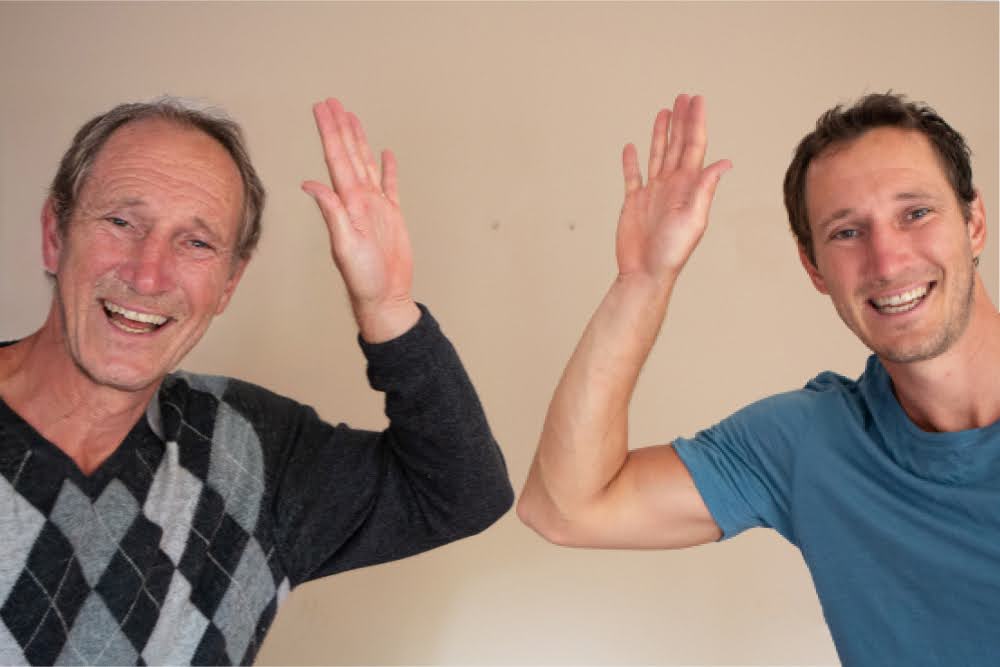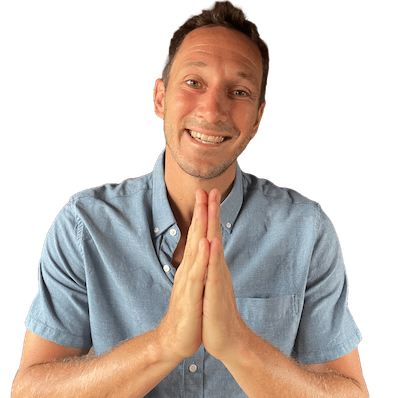Finding Your GPS Signal
For much of my life’s journey, I’ve felt like the GPS of my Google Maps wasn’t working, like this:

Not knowing which direction to go, I played it safe. I followed others. I figured they—or at least whomever they’re following—must have a better signal than me.
This worked out ok for a while. But eventually, I got bored. I started wondering if I was headed in the direction that would make the most of my trip through life.
And that’s when my GPS signal started kicking in.
It turns out that asking the right questions is the trick. Doing so refreshes your map and double-checks if you are on the best route. And the better the question, the clearer the direction.
These are the twelve that have been working best for me so far.
Maybe asking yourself one or two of these questions will help you find your signal, too.

“GPS” Questions to Ask Yourself For Life Perspective and Direction

1. The Perfectionist
Q: What’s your perpetually perfect day?
Squishing “perpetually” into the middle of the more common question, What’s your perfect day?, forces you to think of activities that:
- You enjoy.
- Push you to continually grow, learn, and improve and never get bored.
That way, every perfect day is more perfect than the last.
And good news for most of you reading this and me:
I bet your perpetually perfect day is probably in closer reach than your once-off perfect day.
How I’m Answering It
I look at my life as a physical body, with different “areas” that I need to train to be as fit as possible:

So my perpetually perfect day has to be packed with rewarding activities that are a net positive in each area.
You can see my full perpetually perfect itinerary and more thoughts on coming up with your own answer in my post, What’s your perpetually perfect day?
2. The Value Finder
Q: What are the qualities that you find most off-putting when you see them in others?1I found this in Tony Schwartz’s Harvard Business Review article, Manage Your Energy, Not Your Time.
“By describing what they can’t stand, people unintentionally divulge what they stand for,” writes Tony Schwartz. And knowing what you stand for indicates where you should direct your energy.
Working in that direction fuels the fire under your ass. And any progress you make will feel extra fulfilling.
How I’m Answering It
I can’t stand snobs who excel at fitting in rather than standing out then look down on anyone who acts differently. But I only stopped griping and started doing something about it when I began writing here on The Zag. Now that I’m working on values that I stand for—and against those I can’t stand—I feel like I’ve found my calling.
Related Question to Ask Yourself
- What makes you angry?
3. The Problem Solver
Q: What problem do you solve?
This is the first and most important question of the four-part framework for finding a job you love. Because a fulfilling life tells a great story. And every great story needs conflict.2Check out one of my favorite books that change your thinking, A Million Miles in a Thousand Years for more on this idea.
How I’m Answering It
Rather than let conflict find me, I’m better off finding a problem I’m eager to spend my life trying to solve.
As I’ve made clear in my corny but practical personal mission statement, my problem is the us human’s inane and innate instinct to stick to, settle for, and even defend the status quo. It holds us back from making the most of our trips through life, so I’m trying to find ways to overcome it.
Related Questions to Ask Yourself
- What about the world pisses you off, but doesn’t seem bug most everyone else?
- What’s your personal mission statement? Successful corporations all have them to guide their decisions and actions, and you’re the CEO of Your Life, Inc, so why do you think you can succeed without one?

4. The Strategy Setter
Q: What is your definition of “winning at life”?
Good luck winning at anything if you don’t even know what “winning” means. Yet we tend to race around the game of life, shooting toward goals and hoping it’ll magically happen.
It may be worth taking a strategic time-out.
How I’m Answering It
By asking myself some more thought-provoking questions, I defined what “winning at life” means to me. For what it’s worth, here’s what I came up with:
Winning at life is putting on the best performance I can given my situation so that when my show’s over I feel like I had a blast, others are grateful for it, and my output continues to echo and inspire.
What’s your definition?
Related Question to Ask Yourself
- What measure are you using to keep score in the game of life?
5. The Habit Starter
Q: What one thing could you do (that you aren’t doing now) that, if you did on a regular basis, would make a tremendous positive difference in your life?3This thought-provoking question comes from the classic book with a crappy title, The 7 Habits of Highly Effective People, by Steven Covey.
Your subconscious immediately answers this question for you.
Listen quickly because your conscious catches up soon after, makes excuses and rationalizations, and tries to convince you of something more comfortable but less impactful.
How I’m Answering It
My subconscious tells me, “Be more social.” I ought to work with other people more on my mission rather than hack away at it from behind a computer screen.
My conscious doesn’t like the sound of that. It invents excuses not to do so—e.g., “It’s such a pain in the butt to get people to commit these days.” Then it suggests alternatives closer to my comfort zone, like “Go for more walks” or “Take naps.” But those aren’t as impactful as my subconscious’ answer.
Related Questions to Ask Yourself
- What will I wish I started 10 years from now?

6. The Regret Minimizer
Q: What advice would your 100-year-old self give to you today?
Anyone who says they don’t have any regrets in life is lying to themselves. They’ve painted or plastered over poor decisions from their past so they don’t have to feel bad looking at them.4Mistakes Were Made, But Not By Me, is an eye-opening read on how we delude ourselves. It’s also one of the top “sledgehammer” books that changed my thinking.
There’s nothing wrong with doing so. Rationalizing our mistakes keeps us from losing our minds to what-if-itis.
But it’s better to avoid making such irreversible missteps in the first place.
Consulting with your future self can help you do so.
How I’m Answering It
Old man Chris has tons of advice for me. Train for the “Centenarian Olympics.” Don’t fuss over anything he won’t remember. Focus on, amplify, and record the moments he will want to remember. The list goes on.
PS: Check out my post on how to be less selfish and more socially responsible with your future self for more on this.
Related Questions to Ask Yourself:
- What would you do if, instead of looking to minimize regrets, you wanted to maximize the opposite of regrets?
- What scares you the most in life? The flip side of that fear is probably what your centenarian future self wants you to do.
- What would you do if you knew you had a second chance to try again from the start if it didn’t work out?
- What would you do even if you knew you would fail?
7. The Legacy Beginner
Q: What do you want your great-great-grandchildren to remember you for?
I don’t even know my great-great-grandparents’ names.
Some people do. That’s because their great-great-grandparents did something that left a legacy. They came to the New World, started a family business, created timeless artwork, wrote books, or whatever.5Or they have a descendent who ventured deep into the genealogy wormhole to recreate their family tree. But that’s beside the point.
How I’m Answering It
I want to be remembered as the crazy old ancestor who cracked the code for getting the most out of his life.
Whether I actually leave a legacy is beside the point. As long as I’m striving to do things that echo after I’m gone, I’m winning at life.6See again Question #3: The Strategy Setter.
Related Question to Ask Yourself
- What do you hope people say about you at your wake?
- If you’re younger and don’t want to be morbid, what do you want people to say about you at your wedding?

8. The Un-Settler
Q: What would your 20-year-old self think about where you’re at today?
What our 20-year-old selves lack in wisdom, they make up for in optimism and ambition. They shudder at the thought of settling for a “comfortable” life that isn’t the best they can do. Asking for their input reminds us not to fall into ruts.
How I’m Answering It
“You work by yourself, sometimes with your wife, writing random ideas online?!?!?” is what he’d say. “WTF. And you haven’t come close to visiting 100 countries, bedding 100 chicks, having a few kids, and founding a huge company. You were supposed to have done that by age 30. Now you’re 35. Ouch.”
This wouldn’t bother me. His goals were misguided.7Or I’ve successfully brainwashed myself into believing so.
But I’m listening when he says, “You can do better than just a couple hundred thousand readers a month. Think bigger. Do more, cooler sh*t. Please.”
Related Question to Ask Yourself
- If you could rebuild your life from scratch, what would be different?
- If you were given three years paid leave to do whatever you want and guaranteed to get your current job back afterward, how likely is it you would take it rather than do something different?
9. The Mind-Opener
Q: When was the last time you changed your mind about something important?
Most of us have a hard time coming up with examples. This proves we’re not as open-minded as we think.
It’s easier on our egos to settle on “proof” that confirms our beliefs than look for and listen to evidence that indicates we’re wrong.8Check out one of my favorite books that change your thinking, Mistakes Were Made But Not By Me, for more on this. But doing so puts us on a slippery slope toward becoming a stuck-in-their-ways old person who life has passed by.
This brings to mind one of my favorite quotes:
“The man who views the world at fifty the same as he did at twenty has wasted thirty years of his life.”
Muhammed Ali
How I’m Answering It
I wrote a whole list of things I’ve changed my mind on in the comments of 9 Exercises to Try Today to Be More Open-Minded.
More recently, I’ve changed my mind about how I breathe. I used to think my broken nose was useless and breathing through my mouth was fine. Two books, Breath and The Oxygen Advantage, have convinced me otherwise.
Related Question to Ask Yourself
- For any deeply-held belief of yours: What evidence could change your mind? (Inability to answer this is evidence that you are not open-minded about the topic. See how to be more open-minded and keep an open mind.)

10. The Priceless Life-er
Q: If you had $100 million, what would you do differently with your life?
You’ve probably heard some version of this question before. It’s a classic. A cliché, even.
And your answers are probably cliché, too:
- Spend more time with loved ones.
- Get healthy.
- Quit my job to do something I love doing.
- Blah, blah, blah.
But not blah, blah, blah.
Whatever your answers to this question are, and however cliché they may be, you can and should be working toward them. Money’s a shortcut. With patience and the right approach you can do it—even without $100 million.
How I’m Answering It
I’d find a way to get my close friends and family all living in the same neighborhood. This is something I have to get to work on.
Related Question to Ask Yourself
- What could you remove from life to make it better?
- If everything were one one-hundredth of its price, only for you, how would you live differently?

11. The Gratitude Giver
Q: What do you have now that your future self will long for, or reminisce about fondly?
I’d say this is the most important of all the questions to ask yourself.
These things won’t last forever. Relish them while you still can.
How I’m Answering It
Kim and I have complete freedom to do whatever we want every single day. My parents are healthy. I can dunk a basketball. The weather’s not so bad. And the list goes on.
Life’s great, even if I don’t really know where I’m going with it!
Related Question to Ask Yourself
- What would someone who is much less fortunate than you think if they saw you and how you are (or, more likely, aren’t) making the most of your more fortunate situation?
12. The Role Model-er
Q: What would you want your kid to do in your situation?
This one wasn’t on my radar until I had kids.
While my boys often don’t listen to what I say, they’re always learning from what I do. So if I want them to enjoy extraordinary lives on their own terms, I have to lead by example.
How I’m Answering It
On a micro, day-to-day level, I use this question as the guiding principle for my behavior:
- Prioritize family and friends over all else.
- Give people my attention, devices less.
- Abide by my ever-evolving rules to live by as best I can.
- Add a scoop of Adventure Relish to everything I do.
- Periodically ask my these dozen questions.
On a macro level, it all adds up.
Wrong Is Better Than Lost
For all I know, all my answers to these questions I ask myself about life could be wrong.
But they seem to be helping me find a better direction in life than when I was blindly following along with no GPS signal at all. So all I can do to make the most of my trip through life is keep asking, refreshing my answers, and adjusting course accordingly.
Whatever questions you ask yourself, and whatever your answers may be, hopefully they give you the perspective you need to find your way, too.

"Feedback givers are architects of ideas and catalysts for change."
Can You Help Me?
I desperately need your feedback on The Zag because I'm struggling to improve it. Please leave your quick, 100% anonymous thoughts here.
About the author
👋 I'm Chris. Everything you read on TheZag.com is my fault. My life's work is to design unconventional systems that help people overcome complacency, social pressure, biases, and uncertainty (aka, 'The Suck') to engineer extraordinary lives that unleash their unique potential. Join my newsletter for fresh ideas every 10-ish days. Don't be boring.



Leave a Comment